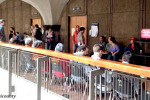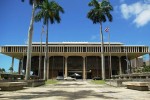Published in The Maui News February 9, 2014
By GLADYS C. BAISA, for The Maui News
I’ve asked the state Legislature to consider a set of bills to allow council members to be more accessible and responsive.
House Bill 2139, introduced by Rep. Kyle Yamashita, and Senate Bill 2962, introduced by Sen. Gilbert Keith-Agaran, would allow members of a county council to jointly attend meetings or presentations as long as they are open to the public.
Currently, state law prohibits a majority of council members from attending public events such as seminars and community meetings if council business is discussed. If even two council members attend, a report must be filed at the next council meeting.
The public rightfully expects council members to attend these gatherings.
Open participation by council members in community meetings ensures responsiveness and accountability. This is particularly important in Maui County, where all nine council members represent all residents of Lanai, Maui and Molokai.
Every council member has a valid interest in attending, for example, meetings of the Kula Community Association, the Hawaii Water Works Association or the West Maui Taxpayers Association. The constant need to monitor the attendance of fellow council members is burdensome and discourages participation.
I submitted testimony to a Senate committee recently in support of this legislation. I can’t stress enough how important it is for elected officials to have the freedom to get out in the community to learn about policy issues.
HB 2138 and SB 2961, also introduced by Yamashita and Keith-Agaran, respectively, stand for the proposition that council members should be able to share amongst themselves documents that the public already has access to. Current law limits council members’ ability to share documents with one another except during meetings.
Oftentimes, withholding documents until a meeting results in the need for a reading break. That time would be more efficiently dedicated to substantive discussion.
If a document is already publicly available, why not allow council members to share it with their colleagues? This is the question I pose to state legislators (who, incidentally, aren’t subject to the restriction).
SB 3113, introduced by Senate President Donna Mercado Kim, and HB 2648, introduced by Speaker Joseph Souki, would codify the council’s existing practices on recessing meetings.
The measure states that a duly noticed public meeting can be recessed and reconvened within five days, so long as the date, time and location of the reconvened meeting are announced during the original meeting and notice is provided everywhere the original agenda was posted (including online). The testimony period remains open, unless it was appropriately closed prior to the recessing.
These practices have been upheld by the Supreme Court of Hawaii and are largely based on advice provided by the late University of Hawaii Law professor Jon M. Van Dyke, reflected in his article titled “Hawai’i’s Sunshine Law Criteria.” It would provide additional clarity to also have them reflected in the statute.
These bills can be viewed at the state Legislature’s website. Council members’ testimony on state legislation is available for public review at www.mauicounty.gov/2014StateLeg.
A hui hou.
* Gladys C. Baisa is chairwoman of the Maui County Council and holds the council’s Pukalani/Kula/Ulupalakua area residency seat. “Chair’s 3 Minutes” is a weekly column to explain the latest news on county legislative matters.






